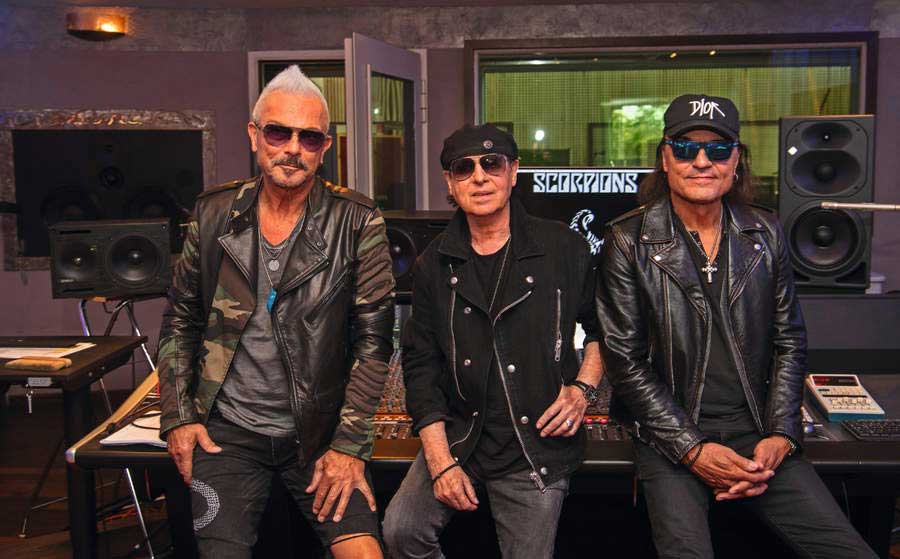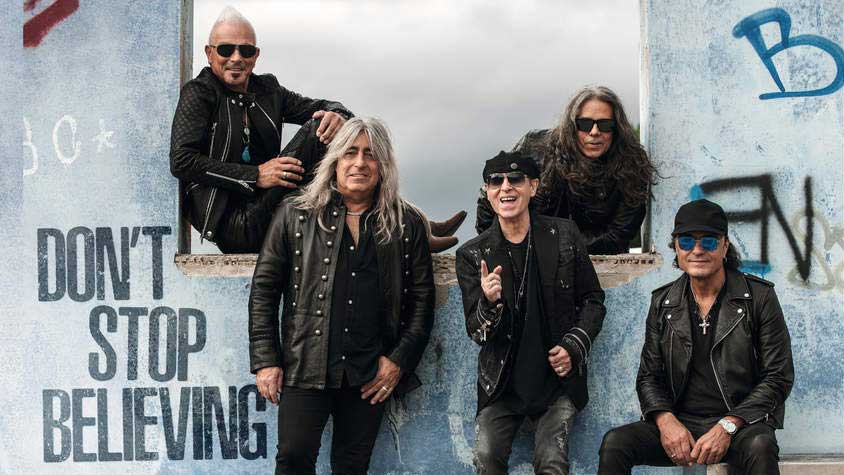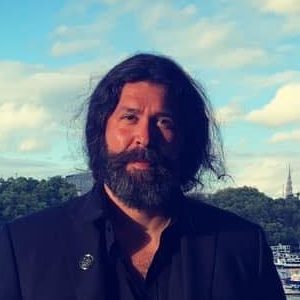“No, really, Klaus, tell us about how the CIA are responsible for Wind Of Change – if Klaus is your real name…”
It’s mid-afternoon, and the grainy quality of this Zoom call makes it impossible to tell whether Klaus Meine and Rudolf Schenker are at all amused. It could be the big black sunglasses they’re both wearing. Of course, it’s hard to know if there’s an ounce of truth to a recent deep-dive podcast called Wind Of Change, investigating whether the Scorpions’ megahit of the same name was really a CIA-backed propaganda tool designed to reunite Germany.
If there is, Meine and Schenker ain’t saying. A beat passes, another, and then finally a smile. Meine, possibly a little resigned to the fact that one of the defining achievements of a band he’s been in for 52 years (and who’ve toured and released records continuously for half a century) is now inexorably connected to a fairly wild theory that went viral over lockdown, says: “We live in crazy times, you know, and of course, when I was confronted by this theory I cracked up laughing.
“Everybody was saying: ‘You’ve got to listen to this podcast!’ Patrick Radden Keefe, a journalist who works for The New Yorker, came all the way to Germany just to tell me in the middle of the interview: ‘Klaus, have you heard the story that the CIA wrote Wind Of Change?’ I was like: ‘What?! Say that again?’ But then I said if that were true, it only proves the power of music.”
“Because the story is good!” Schenker adds. “The story is great! What music can do and the way people believe in it…”
But then it’s belief, and indeed walls and what to do about them, that have been this band’s defining characteristics from the beginning. Aside from their amazing longevity – this year marks the 50th anniversary of their now classic debut album Lonesome Crow – it’s what Scorpions have lived through that is truly the stuff of legend.

Spend some time perusing the euphoric highs of their latest (nineteenth) album, Rock Believer, and it’s not difficult to see why. It has a hard-edged immediacy that Scorps fans will have a hard time dissociating from their hit-studded 80s output. And it’s no muted latest entry sitting in the shadow of former glories; this is an unapologetic, anthemic affirmation of Scorpions’ commitment to deliver on a promise that has shown no sign of erosion or compromise. It’s hard rock mastery, matured to perfection, and it’s overflowing with that key ingredient: fun.
Right now the band are sitting in a lounge in the bowels of Hanover’s Peppermint Park Studios, where they’ve interrupted rehearsals for an upcoming tour – and a Las Vegas residency – to chat to Classic Rock. This is where they wrote and recorded Rock Believer.
“It’s been our home base for the last hundred years,” says Schenker. “It’s been our bubble, where we had the chance to move out of the pandemic and make music. It was like therapy.”
“We came here every other day,” Meine says. “We locked the door, took a deep dive into our creative world and left the cruel reality outside.” There was already a hatful of ideas to choose from for the album, he explains, as it had originally been planned in 2018. But the enforced halt to touring, after they finished their Australian and Southeast Asian run in March of 2020, led to a creative respite that these touring juggernauts don’t often experience. “Maybe the last time was eighty-six?” Schenker offers.
Not to say that this enforced pause was without benefits. The demands of Scorpions’ lifelong touring marathon – despite a 2010 farewell tour that we swiftly breeze past – don’t always lend themselves to the creative freedom necessary for writing a new album.
“On tour you get a lot of feelings from the people, from the audience, and that influences the music you play,” says Schenker. “It fits together, but you have to be careful you’re not becoming a machine.”
“Creativity is not something that is always granted,” says Meine. “That’s why when we said, okay, let’s make a new album, of course the question is: can we deliver? I started writing lyrics in 2019, not waiting for demos from Rudolf. That’s the way we used to work for so many years – always the lyrics came second. This time it was completely upside down. I just started with writing lyrics. And so I was asking myself what the hell is it that I want to write about, and I sent Rudolf some lyrics.
“One song was Gas In The Tank. It was like, dialogue, you know, because Rudolf was not in Germany at the time – he was in Thailand. Sending him the lyrics was like saying: ‘Hey, come on, give me some killer riffs, my friend! I want gas in the tank!”
“It’s amazing, because when you’ve got a routine it’s really hard to break out of it,” says Schenker. “And we had time. No pressure. Enough time to not finish songs, to leave them and come back to them. That was fantastic, and it got us through these terrible times.”
Despite a revised writing method, the classic feel of Rock Believer is undeniable, and it seems to share a common genetic strand with the fork-eyed brilliance of 1982’s bombastic Blackout.
“It was the same situation!” says Schenker. “You wanna know why? On Blackout we had our own pandemic, because Klaus had a problem with his voice so he couldn’t really sing. We couldn’t follow up with a tour, and we had to wait for Klaus, so we used the time to really make songs in a natural way.
"The problem is always that you’re stopping too early because of the pressure that you have to go on tour again. We’ve also had a lot of experience working with the best producers in the world, but they always put us a little bit right or left. Now, because there was no producer involved, we could hang loose.”
Meine pipes up to add that Scorpions were something of an album-making, hard-touring pressure cooker around the time of 1979’s Lovedrive and 1980’s Animal Magnetism albums.
“Everybody wanted us to be on top of the world – the record companies and management [were saying], ‘Now! Make an album, now!’” he recalls. “Now we’re in the winter of our career, and we don’t have to prove anything to anybody other than ourselves. It’s such a great feeling. “Rudolf and myself became songwriting partners so long ago. We were friends anyway, and so to activate that vibe again and again, it’s a great feeling.
"This was the bottom line: just to believe in yourself. We were stuck in Hanover and we couldn’t travel anywhere. It was good to say, okay, we have an amazing engineer, Hans Martin-Buff, we’ll produce this album together with him. We know what we’re doing. We had a long career, and at this point we know what to do.”
This won’t be the first time Scorpions have had to believe in themselves and persevere, of course. This isn’t a band pretending to have it all ahead of them; it’s a band who are comfortable in their own skin, who still quietly give no fucks and are content to let their music and sold-out venues do the talking. That said, you get the sense they’re not too fussed about anniversaries – there’ll be no cake and bunting for Lonesome Crow’s 50th this year, for example.
“It’s not really a big deal for us to make a big celebration out of it,” says Meine. “I mean, it’s pretty crazy that we celebrate fifty years of the Scorpions being recording artists in February. I think one of the reasons we’re still around is because we’re a German band. There are a few more around these days, like Rammstein, but in the early seventies there was nobody. We were young German kids with big dreams. When we went to England in the first half of the seventies it was like: ‘This is where our heroes came from.’
"We were inspired by The Beatles, the Stones, The Who, The Kinks. So to go and play in London at The Marquee was like, ‘Wow!’ And it was make or break – you go there and Melody Maker, the NME, they’re all sitting at the bar ready to kill you!”
It’s an important thread in Scorpions’ journey: the barriers they faced as German artists, and the perseverance required to traverse their then-divided country’s borders. It touches a nerve, perhaps because it’s possible to take Scorpions’ success for granted in the golden hour of their career, when in the beginning such acclaim was anything but guaranteed.
“German kids writing English lyrics, you know?” Meine says. “Our parents’ generations came out of the darkest time of German history. They wanted to just forget about it, and they found their freedom in light, poppy music: Schlager, German pop. We were the first generation growing up in peacetime, and we finally had a great escape out of our little rooms where we lived with our parents. And that was music. That was rock music.
“Our first time in the UK and playing small places like the Lakeland Lounge in Accrington – we played everywhere. We stayed at bed-and-breakfasts and guest houses, we had our rotten transporter driving up the M1 or whatever it was. For months we were touring and playing every club along the road. And it was such a great experience for us. We saw that if we made it in the UK, we’re ready for the next step.
"We knew we were a talented and powerful live band, but to play on The Marquee stage in London’s Wardour Street, where not so long ago the Rolling Stones and Jimi Hendrix played; to prove to yourself that you belong there – or not… Magazines said, like: ‘Crash, bang, Blitzkrieg!’ The Germans were here. The krauts were here! But it was a very positive response.”
“Gary Moore came on stage!” says Schenker, slapping the table. “We finished the encore, and he came on and kissed us! ‘Guys, you were amazing!’”

It wouldn’t be long before they set their sights on America, and the hopeful ambition of the young West Germans was bigger than anything people imagined was possible at the time.
“In Germany, everybody was singing in German – Die Neue Deutsche Welle, the German new wave, all those new artists, you know – and we were headlining Madison Square Garden!” Meine says with a laugh. “And because of that culture barrier, I think it’s one of the reasons for the longevity of the band and why we’re still around. Many people laughed at us, like [iconic German producer] Conny Plank, who said: ‘You want to go to America? Ho ho ho, no chance!’ For us there were no borders at all.
“We fought our way through because we delivered every night live. That’s why Scorpions are where they are today: we’ve always delivered. We had big challenges, playing with Ozzy, Motley Crue, Aerosmith, Van Halen. We co-headlined with Van Halen in San Bernadino in ’83 in front of 350,000 people, and you have to be ready for that!”
It just so happens that today’s interview falls on what would have been Eddie Van Halen’s sixty-seventh birthday. Meine admits that, while he was never close, the bills they shared and the similar waters they swam – the elite stages, the gargantuan crowds – led to a kind of respectful regard, compassion and understanding.
“Eddie’s son Wolfgang will be our special guest for our German dates in the summer, so we still feel connected in that way,” he says. “When Van Halen played for the first time in Germany, they were supporting Black Sabbath. In Hamburg Eddie was coming down after they played, they saw us in the audience and were like: ‘Hey Scorpions!’
"He said: ‘You have no idea that we were inspired by you, so very much. And in the early days, when we played the clubs in LA, we were playing your songs.’ When we played the US festival together, they were just an amazing band, on top of their game. I don’t want to say it was a friendship, but it was very respectful both ways. Eddie has gone way, way too early. It’s very sad.”
There’s a wistful vibe as we talk about those classic tours, and you get the sense that, despite having sold a massive 100 million records, the triumph of Scorpions isn’t about their commercial impact.
As Meine puts it: “We proved them all wrong. Even when people are saying rock is dead we’re still around, and we’re still playing for the rock believers of the world. It’s about knowing where we come from. This is why the band always stuck together, not only going up, but also going down. It was hard to survive grunge and alternative music throughout the nineties. It was a tough one for every classic rock band on the planet.”
“Ah, but on the other hand not so much for us,” Schenker says, with a laugh and wagging his finger. “We already had the Asian markets and Russia. We didn’t have to fight with grunge and alternative bands in America and Europe, we could play stadiums in Asia and Russia.”
So what did you think of Nirvana?
“I liked it!” he says. “I really did! The only thing I complained about was the solos. They were so terrible. I remember wondering why they left out the solo, but later on I understood the whole thing; it was pure energy, it was pure in a different way. Rock became too much glitter. Guitar players became so good that even people in the audience couldn’t see how fast a guitar player was playing. It became too specialised, the philosophy got lost.”
Which brings us neatly back to where we started. Joking and podcasts aside, the poignance and meaning of the moment a divided Germany was no more isn’t lost on Schenker and Meine.
“I will never forget when it happened,” says Schenker. “We were in Paris doing promotion for Crazy World, and Klaus jumped up and pointed at the TV. ‘Look, that’s the Berlin wall!’ That’s unbelievable. People were standing on the wall and jumping down on the Western side, it was so outstanding.”
“We grew up in the shadow of the Berlin Wall in a way,” adds Meine. “A divided Germany was just a fact. People were getting killed, getting shot when they tried to make it from the East to the West.
“It’s a different story from the English perspective, or American perspective. When the wall came down it was such an emotional moment in world history. You could never write a song for a historical event like this, it’s impossible. But the fact Wind Of Change for so many people brings back the memories of this moment in time is amazing.”
Still, for all the attention Wind Of Change gets, it’s maybe the first single from Crazy World – Tease Me, Please Me – that sums Scorpions up best: ‘Never wasted any time, never missed a beat, total satisfaction always guaranteed.’

